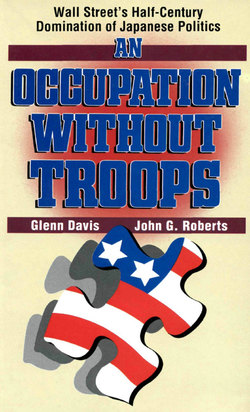Читать книгу Occupation Without Troops - Glenn Davis - Страница 7
На сайте Литреса книга снята с продажи.
ОглавлениеIntroduction
Now that the Cold War is finally over, the postwar history of Japan must be rewritten. Most of the historical works currently available reflect a victor's justice mentality, particularly those scholarly tomes produced by Japanologists originally trained by the intelligence community. Their role in history was to rule Japan, not necessarily through understanding but by applying the brute force of the Occupation, which lasted from 1945 until 1952. The subsequent works of these scholars can hardly be called objective, yet their prefabricated views of America-Japan relations have always been considered the norm.
Even before the end of the Pacific War, there were ongoing factional struggles within the United States State Department concerning policies toward Japan after its inevitable surrender. This struggle continued during the U.S. Occupation of Japan, with one side clearly in the ascendancy.
As might be expected, the successful faction of U.S. and Japanese scholars, government leaders, and military officers who had participated in the making of Occupation policy subsequently enjoyed the privilege of writing its history. Their largely uniform and one-sided characterizations, reflecting obsolete, Cold War attitudes, have only recently come to be challenged by a new generation of Japanologists who came to Japan to study, not to rule.
But still this cadre of elite scholars and their well-indoctrinated disciples tend to hold sway over bilateral relations, ever explaining Japanese history in a fashion that clearly reflects the official State Department line, changed only ever so slightly in the past fifty years. Publications differing from the official line have been discouraged at best and suppressed at worst. At the slightest evidence of opposition from dissident colleagues, these establishment Japanologists close ranks menacingly.
This strategy fits hand-in-glove with the so-called "Japan Lobby," a hawkish faction in the State Department and the Pentagon, which usurped power during the Occupation. The beneficiaries of this covert take-over have exerted decisive influence over America-Japan relations ever since.
The central objective of this work, therefore, is to outline the power structure behind the American Council on Japan and its willing adherents in Japan. We intend to describe the evolution of this power structure, identify the persons involved, and explain how the American Council on Japan consistently and purposefully circumvented, obstructed, or torpedoed the democratic process to achieve its objective of maintaining Japan as a dutiful American Cold War ally, the most important blockade to Soviet and Chinese communist expansionism in Asia.
In classifying the participants in this semi-secret council, it is immediately apparent that the most important are connected directly or indirectly with American big business. Therefore this work will focus on the development, extent and influence of this group on the Japanese social structure, and its role in the official and unofficial channels of communication between Japan and the United States.
To achieve this goal, we devote particular attention to persons and organizations in the ACJ's operations in Japan, and their connections with the Japanese and American economic and political elite.
Our story goes back to the early pre-war period when east-coast elites centered on Wall Street began spinning their elaborate web of personal connections in Japan. In the early postwar period, it was these same elites who played a leading role in shaping U.S. government policy toward a war-ravaged Japan. The same highly sophisticated apparatus is still pulling strings today, as will be demonstrated in the latter part of this work. We strongly feel that the revolutions in eastern Europe, the crumbling of communism in the Soviet Union and the dissipation of Cold War attitudes have isolated these hawks in Japan and America, undermining their raison d'être. And that is precisely why this virtually ignored story must be told at this time. The victor's justice of postwar history must be replaced by an objective analysis of the facts undertaken by independent scholars and researchers.
Based upon original documents, published and unpublished materials, interviews and diaries, this work is not intended to be an expose; with curiosity and patience, anyone could have drawn similar conclusions. It is aimed instead at replacing the empty theorizing and outworn cliches of academic literature on the subject and at building factual bridges for reaching bolder, more realistic interpretations of the most crucial period in the American-Japanese experience.
Above all, this work will not be academic, theoretical, or schematic. We intend to identify and describe real organizations and personages by name, with candid evaluations of their characteristics and significance as well as their inter-connections, secret or otherwise. Whenever possible, we will identify the sources and amounts of funds provided, with special attention to indirect or covert funding by Japanese and American "conduit" foundations, commissions, or governmental agencies.
We believe this work is long overdue and will fill a conspicuous void in the annals of postwar Japanology. In recent publication history, it has become increasingly obvious that cracks have started to appear in the literary dam created by Japanologists within the Japanese and American elite in the postwar period. The increasingly meaningless continuation of U.S. military support for Japan as the bastion of anti-communism in Asia in the face of the democratization of Asian communist powers underlines the importance of our analysis.
